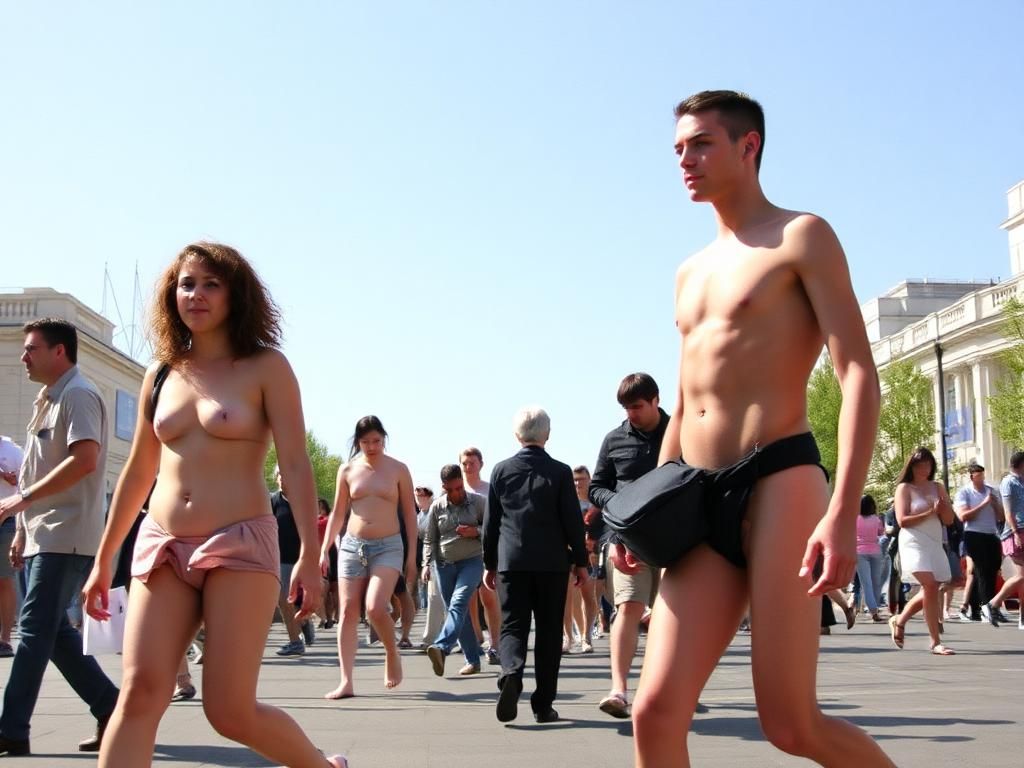Walking naked in public is a topic that elicits a wide range of reactions across various cultures and societies. This term refers to the act of being nude in public spaces, whether intentional or incidental. While some view it as a natural expression of freedom or artistic endeavor, many others see it as a violation of social norms and personal boundaries. Walking naked in public invokes discussions not only about individual rights but also about cultural perceptions of the human body, societal rules, and legal frameworks governing such acts. This article explores the implications, reasons, and regulations surrounding public nudity, shedding light on its historical contexts, societal developments, and psychological influences.
Historical Context
Ancient Cultures
Public nudity has roots in ancient societies that viewed the human body differently than many contemporary cultures. In ancient Greece and Rome, public nudity was frequent in athletic competitions and artistic expressions. The Greeks celebrated the human form in their art, notably through sculptures depicting athletes in the nude. Similarly, in Roman culture, nudity was common in bathhouses and theaters, reflecting a more relaxed view towards the human body. Furthermore, nudity played a significant role in various religious and cultural rituals, symbolizing purity, rebirth, or transcendence.
Modern History
As societies progressed into the 20th and 21st centuries, the perception of nudity began to shift. The emergence of the naturism movement in the early 20th century promoted the idea of being naked in natural settings, encouraging a return to nature and body acceptance. The body positivity movement, gaining traction in recent years, challenges traditional beauty standards and advocates for the acceptance of all body types. These movements have significantly influenced contemporary dialogues about public nudity, emphasizing self-acceptance and the normalization of diverse body representations.
Reasons for Walking Naked in Public
Naturism and Nudism
Naturism, often synonymous with nudism, is a lifestyle that embraces social nudity. Naturism promotes values such as respect for the environment, body positivity, and community. Numerous naturist gatherings and events exist worldwide, allowing individuals to express themselves freely without clothing. Events at naturist resorts or festivals often foster a sense of belonging and acceptance among participants, thus encouraging the act of walking naked in public as an integral part of their lifestyle.
Artistic Expression
Public nudity can also serve as a medium for artistic expression. Performance artists often incorporate nudity into their work to convey deeper messages about vulnerability and societal norms. Additionally, in photography and modeling, artists use nude subjects to challenge viewers’ perceptions of beauty and modesty. These artistic endeavors often provoke thought, generating discussions on body image and the nature of art itself.
Body Positivity and Acceptance
More recently, campaigns promoting body acceptance have gained momentum, encouraging individuals to embrace their bodies in all forms. These movements often feature personal stories that challenge societal expectations, showcasing the beauty in diversity. Individuals who practice walking naked in public often share transformative experiences that promote self-acceptance, fostering a community of support around body positivity.
Legal Considerations
Laws and Regulations
The legality of public nudity varies significantly around the world. In some countries, such as France and parts of Europe, public nudity is more widely accepted, especially at designated beaches or events. In contrast, many places, particularly in the United States, enforce strict indecency laws, often leading to legal repercussions for those caught walking naked in public. Urban versus rural settings also influence perceptions; rural communities may exhibit more leniency than urban environments, making laws contingent on cultural contexts.

Consequences of Breaking the Law
Breaking laws surrounding public nudity can lead to various consequences, ranging from fines to more severe legal repercussions, including arrest. Notable legal battles have emerged regarding public nudity rights, challenging existing laws and advocating for individual freedoms. Cases such as these often resonate through societal dialogues, influencing how people perceive the act of walking naked in public within legal frameworks.
Societal Reactions and Controversies
Positive Reactions
In communities such as naturist resorts, public nudity is widely accepted and celebrated. Advocates of nudism argue that it promotes acceptance and encourages individuals to appreciate their bodies free from societal judgment. Movements advocating for nudity as a form of self-expression are gaining traction, pushing back against rigid societal standards that often dictate modesty.
Negative Reactions
Conversely, public nudity can trigger public outrage and moral objections. Instances of harassment against individuals walking naked in public highlight societal polarization on the subject. Critics point to possible indecency and concerns for children’s exposure as primary reasons for their objections. These negative reactions often spur community debates regarding the appropriateness of public nudity and the fine line between personal freedom and social responsibility.
Psychological Aspects
Mental Health Benefits
Numerous studies suggest that embracing nudity can lead to mental health benefits, such as reduced body shame and anxiety. People who engage in practices like walking naked in public often report increased self-esteem and body confidence. This act can serve as a powerful tool for personal growth, allowing individuals to confront and dismantle societal pressures regarding appearance.
Potential Psychological Risks
Despite the benefits, there can also be psychological risks associated with public nudity. Individuals may experience social anxiety or fear of judgment when exposing their bodies in public. The feelings of vulnerability that accompany walking naked in public can evoke discomfort, making it essential for individuals to understand their motivations and emotional readiness for engaging in such acts.
The Future of Public Nudity
Changing Perspectives
As cultural conversations evolve, societal attitudes towards nudity are shifting. The rise of social media and digital platforms has increased visibility of body diversity, offering a space for dialogue and representation. These changes could pave the way for greater acceptance of walking naked in public as more individuals advocate for normalize body representation and artistic expression.
Potential Challenges
Despite these advancements, challenges remain. Stigmatization and discrimination against individuals who choose to embrace nudity persist, creating hurdles in advocacy efforts. Future discussions will need to balance the right to freedom of expression with community standards, fostering environments where individuals can express themselves without fear of backlash.
| Aspect | Positive Reactions | Negative Reactions |
|---|---|---|
| Acceptance in Communities | Naturist resorts and events celebrated | Public outrage and moral objections |
| Legal Perspectives | Support for nudity rights | Strict laws in many regions |
| Psychological Effects | Increased self-esteem and body confidence | Social anxiety and vulnerability |
FAQ
1. Is walking naked in public legal everywhere?
The legality of walking naked in public varies by location, with some areas having specific laws protecting public nudity, while others may impose strict penalties.
2. What are the psychological benefits of public nudity?
Engaging in nudity can boost self-esteem, reduce anxiety, and promote body acceptance, particularly within supportive environments.
3. Are there safe spaces for walking naked in public?
Yes, many naturist resorts and beaches provide designated areas where nudity is accepted and celebrated.
4. How do communities react to public nudity?
Reactions can vary widely, with some communities embracing it and others responding with outrage and legal interventions.
5. What role does body positivity play in public nudity?
The body positivity movement encourages acceptance of all body types, making nudity a powerful statement against societal beauty standards.
6. Are there risks to walking naked in public?
Potential risks include legal repercussions, as well as social anxiety or feelings of vulnerability.
7. How has social media impacted views on nudity?
Social media has increased visibility for body diversity, facilitating discussions around acceptance of public nudity.
8. Can nudity be an art form?
Yes, many artists use nudity in their works to explore themes of vulnerability, identity, and societal norms.
9. Are there specific events that promote nudity?
Various events, such as nude art walks or naturist festivals, promote public nudity as a form of expression and community.
10. How can I learn more about public nudity laws?
For detailed information on public nudity laws, [this resource](https://www.aclu.org) from the ACLU provides insights into legal perspectives across different regions.
